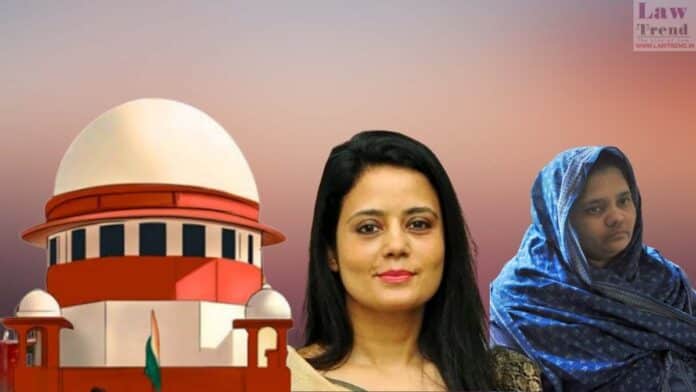The gang-rape of Bilkis Bano and murder of seven of her family members during the 2002 Gujarat riots were a “crime against humanity”, TMC MP Mahua Moitra told the Supreme Court on Thursday, and accused the Gujarat government of having failed to exercise its constitutional mandate of protecting the rights of women and children by granting remission to 11 convicts in the “horrendous” case.
Besides the petition filed by Bilkis Bano, several other PILs including one by CPI(M) leader Subhashini Ali, independent journalist Revati Laul and former vice-chancellor of Lucknow University Roop Rekha Verma have challenged the remission. Moitra has also filed a PIL against the remission.
Challenging the remission granted to the convicts, senior advocate Indira Jaising, appearing for Moitra, submitted before a bench of Justices BV Nagarathna and Ujjal Bhuyan that the State failed in exercising its constitutional mandate of protecting the rights of women and children and chose to ensure their premature release contrary to the law.
“It is submitted that crime committed against Bilkis Bano cannot be viewed in isolation from the situation prevalent in Gujarat at the time the crime was committed and they were in the backdrop of the 2002 riots where sectarian and communal violence was widespread…
“What happened to Bano was cruel, inhuman and degrading. It is my submission that what happened to her was crime against humanity because it happened in a situation of widespread communal violence which was targeted at a community,” Jaising said.
Justifying Moitra’s locus standi (entitlement to bring a lawsuit in court) to intervene in the matter, Jaising said the Trinamool Congress MP has approached the top court in public interest and she is not a “busybody” as argued by the convicts.
“Petitioner is a public personality being a Member of Parliament who has sworn an oath of allegiance to the Constitution and thus has the locus to file a petition as a bonafide person and citizen of India.
“She is discharging her fundamental duty under Article 51 A (e) under the Constitution seeking to promote harmony and common brotherhood among people of India transcending religious and linguistic boundaries. The petitioner is not a busybody or bystander,” the senior lawyer said.
Senior advocate Vrinda Grover, appearing for retired IPS officer Meeran Chadha Borwankar and others, said Bilkis Bano has acknowledged that others approaching court is what gave her the confidence.
“What is required is there needs to be greater transparency in the process of granting remissions. This is one of my prayers…News of remission reached through media which stunned her (Bilkis). There is a mandate of State under RTI Act to upload matters of public importance on their official website. This will also require consideration,” she said.
Grover also submitted that non-payment of fine by the convicts makes their remission illegal as they cannot be deemed to have served their sentence.
“This is an admitted position that fines have not been paid by anyone. Total fine on all counts comes to Rs 34,000. Total years that would have to be served is 34 years on account of non-payment of fines,” she said.
The hearing will resume on August 17.
The convicts in the case had told the apex court on Wednesday that entertaining PILs by multiple people challenging their remission will open a “pandora’s box” and set a dangerous precedent.
Challenging the maintainability of the PILs, advocate Rishi Malhotra, appearing for one of the convicts, had said no fundamental right of the petitioners has been violated and they are total strangers to the trial.
Additional Solicitor General S V Raju, appearing for the Gujarat government, had submitted that remission is essentially a reduction of sentence and no third party can have a say in it as the matter is between the court and the accused.
“Public outcry will not affect our judicial decisions,” the top court had asserted on Tuesday, as it began weighing the legality of the remission granted to all the 11 convicts in the gang-rape and murder case.
The bench made it clear that agitations and society’s outcry will not have an effect on its decisions and that it will go only by the law.
The apex court was earlier told that the convicts chased Bilkis Bano with a “blood thirsty approach” to hunt Muslims and kill them.
Also Read
It had on April 18 questioned the Gujarat government over the remission granted to the 11 convicts, saying the gravity of the offence should have been considered before showing leniency, and wondered if there was any application of mind. All of them had walked free on August 15, 2022.
Asking for reasons for the premature release of the convicts, the top court had also questioned frequent parole granted to them during their incarceration.
“It (remission) is a kind of grace, which should be proportional to the crime,” it had said.
Terming Bilkis Bano’s gangrape and the murder of her family members a “horrendous” act, the apex court had on March 27 asked the Gujarat government whether uniform standards, as followed in other murder cases, were applied while granting remission to the convicts.
Bilkis Bano was 21 years old and five months pregnant when she was gang-raped while fleeing the horror of the communal riots that broke out after the Godhra train-burning incident. Her three-year-old daughter was among the seven family members killed in the riots.




